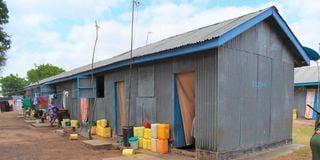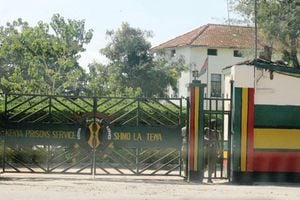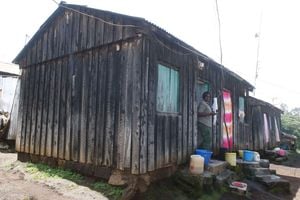
Some of the houses for police officers at the Shimo La Tewa Maximum Prison on February 7, 2023.
Kenya Prison Service officers stand out among government employees living in squalor, a report by Auditor-General Nancy Gathungu reveals.
From a sample of 17 prison stations across the country, the performance audit report on the provision of housing to prison officers in Kenya tabled in Parliament shows how the officers and their families are living in conditions only comparable to “animals in the jungle”.
First, the audit shows that the service has 3,894 permanent housing units in the entire country against a staff population of 23,831.
The report reveals that in all the stations that were sampled, life is unbearable. Officers in charge said that indecent housing has not only affected work performance but also social life of the staff.
The audit shows that senior officers are allocated houses suitable for junior cadres while junior officers are accommodated in temporary shanties that include aged A-frames and uni-huts, mud, iron-sheet and timber houses.
Newly recruited officers are accommodated in open halls and stores partitioned using cardboards, newspapers, bed sheets or polythene papers, where they are supposed to live with their families.
The houses, the audit says, lack basic amenities like water and sanitation, exposing them to indignity.
“The officers complained about the bad conditions of their houses which has affected their family life because they are embarrassed to entertain visitors since they lack privacy in the house’ among other issues,” reads the audit report.
This is notwithstanding that Article 43 (1) (b) of the Constitution states that every Kenyan citizen including prison officers, has a right to accessible and adequate housing.
The Kenya Prisons Service charter considers decent housing as one of the rights of prison staff members.
“In this regard, the houses used for accommodation of prison officers should be in good living condition,” the audit says.
The 17 sampled stations include Kakamega GK Prison, Kilifi GK Prison, Shimo la Tewa Women Prison, Ruiru Farm Prison, Murang’a GK Prison, Kaloleni GK Prison, Nairobi Remand and Shimo La Tewa Borstal.
The others are Eldoret GK Prison, Shimo la Tewa Maximum Prison, Nairobi West, Nyeri GK Prison, Shimo la Tewa Medium Prison, Kamiti Main, Naivasha GK Prison, Lang’ata Women and Kisumu Command.
The audit shows that a majority of houses in these stations are dilapidated and generally have broken windows and doors, damaged and faded walls, run-down amenities and rusted leaking roofs.
“Instances of aged and dilapidated mud houses being used to accommodate staff were observed in Eldoret, Kakamega, Shimo La Tewa and Kilifi stations, among others,” the audit says.
“Although the Kenya Prisons charter does not define what a decent house should look like, it was generally agreed after discussions with the management that a decent house would be a self-contained single room (bed-sitter 11) with basic amenities— water, electricity and sanitation facility— for junior officers without a family.”
A decent house would include a self-contained one-bedroomed house with basic amenities for junior officers with families and a two-bedroomed self-contained house with basic amenities for senior officers with or without family.
The initial stages of prison reforms introduced in 2003 saw the construction of two and three-bedroomed self-contained houses, commonly known as Moody Awori houses.
This was followed by the Rapid Results Initiative (RRI) that has since gobbled Sh1.6 billion.
Under the RRI plan, the officers in charge were given money and encouraged to use locally available labour and materials to construct staff houses. But with little funding, they were forced to build makeshift and temporary structures.
The Prison Act mandates Kenya Prison Service to ensure that all its uniformed staff are housed within the stations.
While the inadequate housing units in prison lines would have given the officers an alternative elsewhere, the law does not allow this, meaning that the officers have no option but to find spaces within the prison lines.
The audit notes that out of 384 officers interviewed, 139, about 36 per cent said they have low work morale.
Another 89, about 23 per cent and 50, which is 13 per cent, stated that their work performance is generally affected and suffer constant stress.
About 138 officers who participated in the survey said they were not living with their families at their work stations.
Sixty-two per cent of the 138 officers interviewed said that the main cause of separation from their families was lack of proper accommodation.
The Auditor-General said that the indecent housing also cost the government rental income.
Senior officers are expected to be accommodated in houses that attract rent at market rate since they receive a monthly house allowance.
However, the audit revealed that most of the senior officers are accommodated in houses which do not attract rent.
Data shows that Kenya Prison paid officers Sh129 million in house allowance during the 2012/13 financial year but only received Sh17.8 million paid as rent.
As at the end of 2016/2017, the house allowance paid by the Kenya Prison staff had risen to Sh192 million whereas the receipts in form of house allowance at market rate had stagnated at Sh18 million.
Instances of officers being accommodated in single rooms with their families, while other officers shared rooms compromised their privacy, the audit report stated.
There were cases where four families shared two-bedroomed houses, whereas two families shared one bedroom houses.
The audit also revealed that 150, about 33 per cent of the 450 officers interviewed were found to be sharing houses.
Shimo la Tewa Main and Kilifi stations recorded the highest percentages of officers sharing houses at 75 per cent and 71 per cent, respectively while Kaloleni and Murang’a stations had the least percentage at 6 per cent and 14 per cent. Further, 76, about 51 per cent, of 150 officers who were sharing houses had families.
This was more predominant in Coast and Rift Valley regions where 28 per cent of officers had their families living with them in the shared houses.
Besides, up to 57 per cent of the officers living with families in shared houses were either accommodated in single rooms or bedsitters.
The living conditions of the prison officers are aggravated by the fact that their houses lacked basic amenities especially water and sanitation facilities.
“The non-availability of basic amenities may be attributed to lack of emphasis on basic amenities as an important component of housing,” the audit says.
The officers who live in temporary structures are forced to use communal watering points located approximately 500m away from the house.
In most of the flats like in Kamiti Main, Lang’ata Women, Kisumu Main, and Ruiru stations, the audit revealed that despite the fact that the houses were supposed to have running water, most of the taps were dry as at the time of audit.
Of the houses that lacked sanitation facilities, the officers shared the available toilets and bathrooms while others constructed temporary sanitation facilities.
The audit also observed dilapidated sanitation facilities used by officers in Shimo la Tewa and Kisumu Main prisons.
At least 261, about 59 per cent of the officers interviewed indicated that they did not have sanitation facilities in their houses.
The most common alternative sanitation methods were therefore communal and own-built temporary sanitation facilities.
The audit, however, blames the lack of enough decent houses to the shift in policy.
Instances of houses being abandoned as new policies replace previous ones, have been revealed. In 2015, the Ministry of Lands Housing and Urban Development indicated that 230 units, both RRI and Moody Awori, were abandoned before completion mainly due to shift in policy.
At Eldoret GK Prison, the audit stated that 30 units of Moody Awori houses, started in 2006, had stalled. The introduction of the RRI programme in 2007/08 did not help as the houses constructed were single rooms and bed-sitters.
dmwere@ke.nationmedia.com






